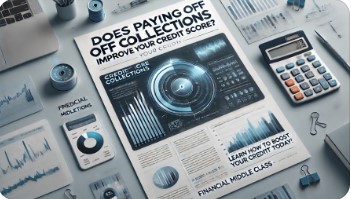The answer to whether paying off collections will improve your credit score is: it depends. If you’ve ever found yourself dealing with a collections account, you know just how stressful it can be—not to mention the hit your credit score takes. But many people wonder if paying off those collections will actually help their credit. Discover if paying off collections improves your credit score and learn practical steps to boost it today. The answer isn’t always straightforward, and understanding the nuances can make a big difference in how you approach your credit repair journey.
How Collections Affect Your Credit Score
Collections accounts show up on your credit report after you’ve missed payments for an extended period, and your original creditor decides to sell the debt to a collection agency. Once a collection appears, it can seriously impact your credit score. The impact is typically most significant during the first two years, and its effect diminishes over time. However, having collections on your report can still hinder your ability to get approved for loans, credit cards, or even rental agreements.
Paid vs. Unpaid Collections
credit score impact, paid collections, credit repair tips In most credit scoring models, both paid and unpaid collections are considered negative marks. That said, the newer FICO 9 and VantageScore 3.0 and 4.0 models do make distinctions between paid and unpaid collections. With these models, paid collections are often ignored, which can help boost your score if you pay them off. However, older scoring models, like the widely-used FICO 8, still count paid collections as negative, which means paying them off might not yield an immediate score increase.
Should You Pay Off Collections?
If your goal is to qualify for a mortgage or other major loan, paying off collections can make a difference—not necessarily in your score, but in the eyes of the lender. Many lenders prefer applicants who have taken responsibility for outstanding debts, even if those debts still appear on their credit report. Plus, paying off collections will prevent the account from being resold to another agency, which could restart collection activities and cause further damage to your credit.
Strategies to Improve Your Credit After Paying Off Collections
- Negotiate a “Pay-for-Delete” Agreement: One way to potentially improve your score is to negotiate a pay-for-delete agreement with the collection agency. This is where you agree to pay the debt in exchange for the agency removing the account from your credit report. Keep in mind, however, that not all agencies will agree to this.
- Dispute Inaccuracies: Once you’ve paid off a collection, check your credit report to make sure the account is updated accurately. If there are discrepancies, dispute them with the credit bureau.
- Focus on Building Positive Credit: Paying off collections is just one part of the puzzle. To truly improve your credit score, you need to build positive credit history. This means paying all your bills on time, reducing credit card balances, and avoiding new derogatory marks.
Bottom Line
Paying off collections can help improve your creditworthiness, especially if you’re dealing with newer scoring models or trying to qualify for a loan. However, it’s not a magic fix for your credit score. The real benefits come from demonstrating consistent, responsible financial behavior over time. Whether or not your score immediately jumps, paying off collections is a step in the right direction toward regaining control of your financial health.







